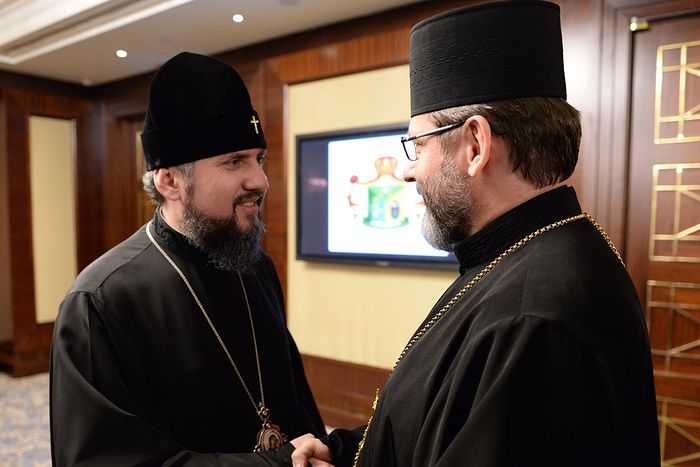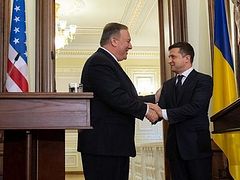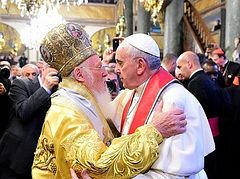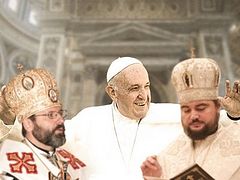Since the very beginning of the emergence of the project called the “Orthodox Church of Ukraine” (OCU), it was clear that in order to popularize it within the nation, a bet was lodged on nationalistic sentiment.
In addition to the division caused within the Orthodox world, and the attempt to raise the rating of former president Petro Poroshenko, another “chimera” produced by the Ukrainian schism crystallized rather quickly—active collusion with the Uniates.
On the official website of the Ukrainian Greek Catholic Church (UGCC), information was posted that on February 3, 2020, “bishop” Boghdan Dzyurakh, on behalf of the head of the Uniates (Svyatoslav Shevchuk), congratulated Epiphany Dumenko on the anniversary of his “enthronement”, saying: “We will deepen our connections and cooperation.”
This phrase could be treated as an offer of respect, if we view it within that prism. Then, on the eve of Christmas 2020, Svyatoslav Shevchuk gave a huge interview to “Glavkom” Publishing House, where he noted that the Uniates are very closely monitoring all the processes taking place inside Orthodox society, and possess their own ecumenical concept, and really want to develop a common roadmap for cooperation with the OCU. The head of the UGCC also pointed out that in relations with the Ukrainian schismatics, emphasis should be placed on an ecumenical upbringing for the clergy and laity on both sides. The fruits of their encroachment were not long in coming, and quickly went beyond simple conversations.
“It is also a very important opportunity for us to pray together. We already had that opportunity, especially when we honored the memory of the victims of the Holodomor last year. This practice of common prayer is very important. If we pray together, it constitutes our declaration that we believe in one God. This is already an act of mutual recognition” Shevchuk noted.
It must be said, that this is not the only example of joint prayer between the Uniates and schismatics.
As is seen, in conversations about the relationship between the UGCC and the OCU, the term "ecumenism" is often used. In order to avoid any ambiguities, we will give it a clear definition from the “New Philosophical Encyclopedia”: “Ecumenism is a movement for the coming together and unification of various Christian churches (confessions), one of the mechanisms of inter-Christian relations. The goal of modern ecumenism is interfaith communication, unity and cooperation.”
Based on the fact of the joint prayers of representatives of the schismatics and Uniates, it can be said that in these relationships, they have already crossed the line of simple communication, and are moving towards merging. At least according to external declarations, it should be understood that in matters of doctrine, the OCU claims to adhere to Orthodoxy, while the UGCC—to Catholicism. Aristotle wrote in his work Nicomachean Ethics: “May both my friends and Truth be dear unto me, but sacred duty commands me to give preference to the Truth.”[1]
Therefore, for the sake of the Truth, having rejected all tolerance, it is necessary to call things by their proper names, and recognize that Catholics are heretics at least on the basis that they teach that the Holy Spirit “proceeds from the Son” (Filioque), the immaculate conception of the Theotokos, about purgatory, about the infallibility of the Pope, and so on.
It is not in vain that Saint Mark of Ephesus wrote: “Do you hear how they have departed not only in customs, but also in dogmas foreign to those of Orthodoxy—and what is foreign to Orthodox dogma is, of course, heretical teaching… One must flee from them as one flees from a snake, as from the Latins themselves, or, it may be, from those who are even worse than they—as from buyers and sellers of Christ.”[2]
As we see, the representatives of the OCU who consider themselves Orthodox, not only do not run away from communication with the Uniates, but on the contrary, strive for it. And if Saint Mark is not an authority for anyone, then here is what the tenth Apostolic Canon says: “If any one shall pray, even in a private house, with an excommunicated person, let him also be excommunicated,” and here is the thirty-third canon of the Council of Laodicea: “No one shall join in prayers with heretics or schismatics.”
The fact that the schismatics do not care about the canons of the Orthodox Church does not surprise anyone, but if they have no principles in matters of doctrine, then we need to determine what can serve as the basis for the unity of the Ukrainian schismatics with the Greek Catholics.
It’s not a secret for anyone that the functioning of the “Kiev Patriarchate” and the creation of the OCU took place under the idea: “Ukrainian State—Ukrainian Church”[3]. The very content of this idea already suggests that there is no place for true Christianity in it. In general, further statements and actions of the "hierarchs" of the schismatic organization make it clear that nationality is more important for them than an ecclesiastical character.
Take for example Epiphany Dumenko, who on his Facebook page issued support for the scout organization “Plast”, whose members were active in the Organization of Ukrainian Nationalists even during World War II. In April 2019, during his visit to Lviv, he declared that he was proud to be a “Banderist”[4], and in August of that year, along with Svyatoslav Shevchuk, he “consecrated” a monument to the “heroes” of the Organization of Ukrainian Nationalists-Ukrainian Insurgent Army. Also, one of the current “hierarchs” of the OCU, the odious Mikhail Zinkevich, back in 2016, declared the UIA soldiers to be counted among “all the saints of the Ukrainian land”, and on January 1, 2020, “bishop” Victor Bed’ served a memorial service for Stepan Bandera. The list of such examples can be continued for a very long time, but those mentioned are quite enough to understand what is important, and what is not important for the schismatics.
We can see the exact same situation in the UGCC, which for a very long time has been closely cooperating with and supporting Ukrainian nationalists, from the more moderate, to outright Nazis and racists. We all remember very well how during WW2, the Uniates openly welcomed the German occupation forces, and their leader Andrei Sheptytsky even sent a congratulatory letter to Hitler on the occasion of the capture of Kiev.
The UGCC also actively participated in the creation of the SS Galicia division, which, together with the UIA, was engaged in brutal ethnic cleansing, in particular, in villages such as Huta Penyatska (500 people were killed), Pidkamin' (250 people), Bychkovitsy (73 people), Lapovtsy (80 people), Hermakivka (30 people), Mala Berezovytsya (131 people), Korostyatin (78 people), and others. Since that time, nothing has changed, and on January 28, 2020, the Uniate "archbishop" Vladimir Viitishin conducted a solemn funeral service for veteran of the SS Galicia Division, Mikhail Mulyk.
Thus, we can conclude: if representatives of the OCU and the UGCC honor Ukrainian nationalists, in particular Stepan Bandera, then they are also supporters of the ideas that he professed. Behind the cries and slogans today, few people remember that Bandera also left behind written works in which his worldview is displayed.
For example, in the work, “Perspectives of the Ukrainian Revolution”, he writes the following: “Every nation in its own home must establish ‘its right’…Ukrainian nationalism opposes the so-called Bolshevik internationalist idea of the independence and free development of each nation."
And here is how he writes regarding the Russians: “The Moscow nation itself is haunted by the demons of imperialism, the desire to be ever greater, more powerful, richer, but not by its own growth, but by the enslavement of other nations.”
It turns out that for Ukrainian schismatics and Uniates, national ideas are more important than Christian ones, and this is exactly the point where they are very close with one another. For them, a person is “one of us” not because he is a Christian, but because he is one of “our” nation. Such an attitude to the national question was condemned by the Council of Constantinople in 1872, in the resolutions of which, the following definition appears:
“We reject and condemn tribal division, that is, tribal differences, nationalistic strife and discord in the Church of Christ, as contrary to the Gospel teaching and the Sacred Canons of our Blessed Fathers, on which the Holy Church is established, and which, adorning human society, lead to divine piety. Accepting such division according to tribes, and daring to base on it uncalled for tribal divisions, we proclaim to be, according to the holy canons, alien to the One Catholic and Apostolic Church and [those who make tribal divisions in the church to be—Trans.] true schismatics.”
Therefore, to summarize:
- The leaders of the OCU and UGCC openly demonstrate an active striving for unity;
- unity is possible only on the basis of [common] principles or ideas;
- doctrinal issues for them are not of fundamental importance, respectively, there must be a different basis for unity;
- the words and deeds of the leaders and “hierarchs” of the OCU and the UGCC indicate that they are supporters of the ideas of Ukrainian nationalism;
- accordingly, Ukrainian nationalism is something that unites the schismatics and Uniates;
- and therefore, according to the decisions of the Council of Constantinople in 1872, both of them are alien to the Church of Christ, and should be called schismatics.





